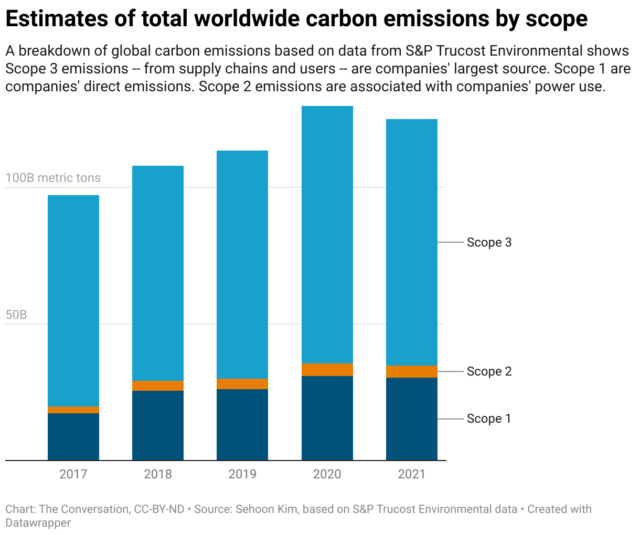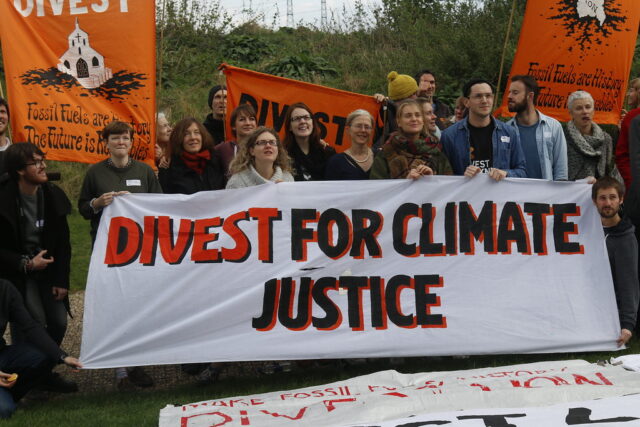Corporate Carbon Footprint Fraud
How corporations weaponize carbon footprints to blame individuals and escape liability
Chloe Meyers
June 24, 2024
Have you ever been asked to switch to paperless billing to reduce your carbon footprint? What about reusing the packaging your purchase came in when making a return? Do online retailers ever ask you to make your online order “carbon positive” by adding carbon offsets to your cart?
As consumers, we are constantly bombarded with ways to reduce our carbon footprints. But have you ever wondered: what is a carbon footprint, and why is it my responsibility to reduce it?
What is a carbon footprint?
‘Carbon footprint’ is a term used to measure an individual’s contribution to climate change. The term was popularized in a 2003 BP advertising campaign, where BP asked people on the street what their carbon footprint was and encouraged them to use BP’s new carbon footprint calculator to find out. The advert ended with the slogan, “It’s a start.”
This ingenious marketing campaign encapsulates corporations’, such as BP’s, agenda in pushing the phrase ‘carbon footprint’ and usage of carbon footprint calculators: to shift responsibility for mass carbon emissions from corporate actors onto individuals. BP’s ad marked the beginning of what has become one of the most successful yet deceptive PR campaigns: the carbon footprint. Today, consumers think about every action they take – from going to work, buying food, and even turning on the lights – as part of their carbon footprint, and thus a contribution to climate change.
While the usage of ‘carbon footprint’ started as a marketing tool, this term has caught global attention and become a mainstay in the discourse on emissions reductions. ‘Carbon footprint’ has become the key phrase in describing climate responsibility, both for individuals and enterprises. Today, even the EPA has a carbon footprint calculator. Online news providers such as mashable and the New York Times have published articles advising its readers on how to reduce their carbon footprints. Even prominent environmental nonprofits like the World Wide Fund have promoted individual carbon footprint reduction. Given its ubiquitous use today, it’s easy to forget about its fraught past.

A Quorn ad campaign, in which they position themselves as a ‘sustainable’ brand by suggesting consumers will lower their carbon footprint by purchasing their new product.
The Narrative of Consumer Control
From 1988 to 2017, just 100 companies made up 71% of global greenhouse gas (GHG) emissions. Over half of these emissions can be traced back to a mere 25 corporations and state-owned entities. Fossil fuel companies contribute the greatest amount of GHG emissions of all corporations, emitting carbon and other GHGs from oil, gas, cement, and coal production.
While the fossil fuel industry is the primary contributor to climate change, it is not the only emitter of GHGs. Airlines, non-fossil fuel corporations, agriculture, and even consumers bear some responsibility for climate change. While fossil fuel companies extract, refine, and market fuels, consumers buy and use the GHGs provided by corporations. Richard Heede, co-founder and co-director of the Climate Accountability Institute, has found that “the emissions directly produced by oil, gas, and coal companies amount to about 10 percent of fossil fuel emissions,” while “ninety percent are from their products.” Thus, it appears that through consumption, individuals bear some responsibility for climate change.
For decades, corporations have successfully pushed the narrative that consumers are in control and corporations are mere tools to be used by consumers in their quest for satisfaction.
Capitalizing on this phenomenon, corporations have advanced the narrative that individuals control demand for GHGs through consumption, while corporate entities are mere passive agents that produce and supply fossil fuels at the discretion of consumers. Accordingly, consumers are the primary party responsible for GHG emissions, and thus bear the burden of reducing emissions by lowering their carbon footprint. Ben Franta, a Senior Research Fellow in Climate Litigation at the Oxford Smith School of Enterprise and the Environment, explains that “polluting industries want to make themselves invisible, and they want to promote themselves or portray themselves as not having any agency to solve this problem, and so they put all the agency on the consumer.” This in turn “fits with an economic ideology of market primary, where [] consumers demand it, then producers are just passively supplying that demand.” In reality, however, corporate actors are controlling consumer choice through industry capture.
This is not a new narrative. For decades, corporations have successfully pushed the narrative that consumers are in control and corporations are mere tools to be used by consumers in their quest for satisfaction. Take the classic slogans for Burger King, “you rule” and “have it your way.” These embody the disguise corporations wear, acting as if consumers are in control and corporations exist solely to serve them.
While corporations have acted under this guise for many years, there has been growing recognition of their knowledge of and role in climate change. Various lawsuits have been brought against Exxon, Chevron, and BP by a variety of states and cities, including New Jersey, California, New York state, New York City, Baltimore, and Puerto Rico. These suits argue that fossil fuel companies engaged in fraudulent behavior by failing to disclose past, present, and future climate change risks. While these suits are all filed against the fossil fuel companies generally, they are targeting “the officers, directors, agents, employees, or representatives of Defendants [who] committed or authorized such an act or omission [regarding climate change risks], or failed to adequately supervise or properly control or direct their employees while engaged in the management, direction, operation or control of the affairs of Defendants, and did so while acting within the scope of their employment or agency.”
According to these lawsuits, fossil fuel companies had early knowledge of the risks their products posed, and instead of taking action to ameliorate those harms, they continued to invest in fossil fuels and grow the market. Further, these companies misrepresented devastating climate-related impacts on the environment, and even more sinister, blamed consumers for those harms through marketing campaigns like BP’s carbon footprint ad.
While most of these cases’ results have favored the fossil fuel companies, there are still benefits to bringing cases of this sort. Litigating against fossil fuel companies increases awareness of corporate injustice by providing opportunity for discovery and offering a forum for courts to express their discontent with fossil fuel companies’ practices, even if they aren’t illegal. For example, while the Superior Court of California ruled in favor of Exxon in People of California ex rel. Bonta v. Exxon Mobil Corp., they were still able to provide dictum on Exxon’s wrongdoings: “[o]il and gas company executives have known for decades that reliance on fossil fuels would cause these catastrophic results, but they suppressed that information from the public and policymakers by actively pushing out disinformation on the topic.”










